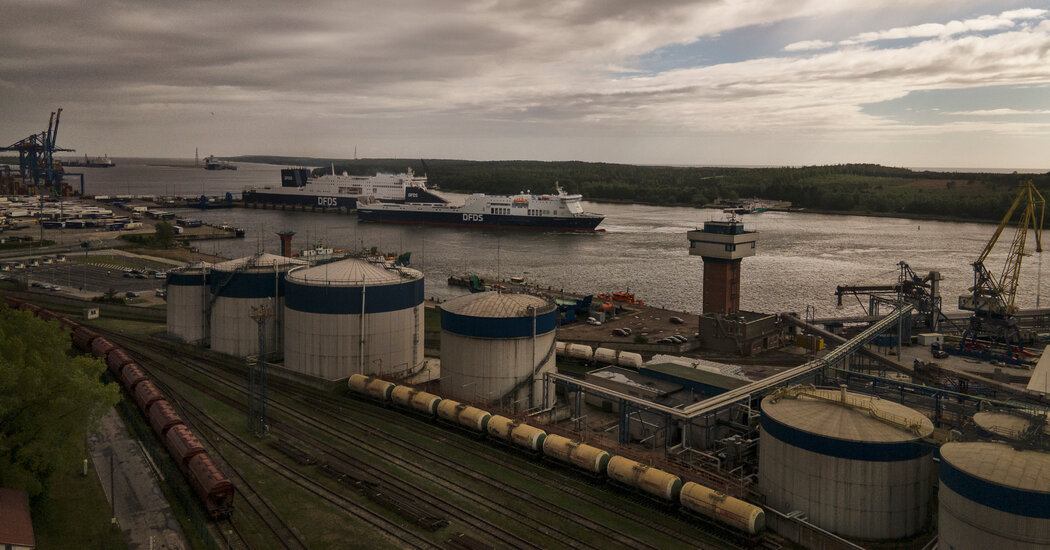
KLAIPEDA, Lithuania — The Baltic Sea port has silos to store plenty of grain, railway lines to transport it there from Ukraine, where it has been trapped by the war, and a deep harbor ready for ships that can take it to Egypt, Yemen and other countries in desperate need of food.
“Starvation is near, and we have everything that is needed to provide part of a solution,” said Algis Latakis, the director general of Klaipeda Port on Lithuania’s Baltic coast, insisting that his facility can help the world avert a food catastrophe by getting out the vast mountains of grain now stranded in Ukraine.
But, Mr. Latakis conceded, there is one big problem: Aleksandr G. Lukashenko, the president of Belarus — who in February let Russian troops pour into Ukraine from his territory. Belarus controls the railway lines offering the most direct, cheapest and fastest route for large volumes of grain out of Ukraine to Klaipeda and other Baltic ports.
But doing so would mean cutting a deal with a brutal leader closely allied with President Vladimir V. Putin of Russia, underscoring the painful moral and political decisions that now confront Western leaders as they scramble to avert a global food crisis.
Numerous options are being considered to get the much-needed grain out of Ukraine, including sending barges down the Danube River, or by truck and train through ports in Poland and Romania — all of which come with considerable challenges. Hardest of all would be reopening the Black Sea port of Odesa, currently mined by Ukraine against invasion and blockaded by Russia.
The Lithuania route appears to be the most promising for getting food quickly to areas like the Middle East and Africa that need it the most, even if it is also a long shot.
“This is a decision that politicians need to take not me,” Mr. Latakis, the Klaipeda port director said. “It is up to them to decide what is most important.”
Leaders of the European Union and the United States publicly insist that feeding hungry people trumps other concerns. In private, however, there is intense wrangling over how to do that without rewarding either Russia or Belarus, both of which are angling for relief from sanctions in return for help in heading off starvation.
Western nations like the United States, as well as Ukraine, oppose lifting sanctions imposed on Russia over its invasion but have not ruled out a deal with Belarus.
Until Russia invaded on Feb. 24, Ukraine shipped most of its agricultural products through Odesa, and its main port on the Azov Sea in the now pulverized city of Mariupol.
The war has halted those shipments, leaving around 25 million tons of grain, according to U.N. estimates, from last year’s harvest stranded in silos and at risk of rotting if it is not moved soon. A further 50 million tons is expected to be harvested in coming months. The grain elevators in Ukraine that have not been damaged or destroyed by shelling are quickly filling up. Soon, there will be no room left to store the incoming harvest.
Dmytro Kuleba, Ukraine’s foreign minister, said severe bottlenecks meant that the existing routes through Poland and Romania “can provide only limited alleviation of the food crisis” given the volumes that need to be moved.
In a written response to questions, he said the best solution would be for Russia to lift its blockade of Odesa or for Western countries to send warships to escort grain carrying vessels.
But, Mr. Kuleba said, this “is an extremely difficult undertaking, which involves a lot of security risks.”
He declined to comment specifically on the Belarus option, but said: “We are desperate to export our food as soon as possible. Whatever works.”
Warning of an approaching “hurricane of hunger,” the head of the United Nations, António Guterres, has sought to negotiate a deal under which Ukrainian grain would be transported out of the country by ship or train, and in exchange Russia and Belarus would sell fertilizer products to the global market without the threat of sanctions.
For farmers in Ukraine, just days away from sowing their second crop of the year, exporting their grain is perhaps the most urgent task in their now perilous profession.
War has devastated once fertile land, and farmers are short of diesel, most of which used to come from Russia and Belarus. Some are scared to plow fields they fear may be mined. Others struggle to fend off Russian forces seizing their crops and tractors.
“Before, it was just about making profits,” said Andrii Holovanych, a manager of Zakhidinyi Buh, a farm in western Ukraine near Lviv where workers in body armor and helmets rumble by on tractors. “Now, I really feel the work we do makes a difference — not just to Ukraine, not just to my own family’s wealth, but the entire world.”
Russia blames the farmers’ agonies on the West, arguing that they can be easily eased by a lifting of sanctions. That, said Gabrielius Landsbergis, Lithuania’s foreign minister, is a non-starter unless Russia withdraws troops from Ukraine and Belarus halts its repression.
“Practically and politically this is not a viable option,” he said in an interview in Vilnius, the Lithuanian capital. “We are dealing with two dictators who are waging war against Ukraine. They are the ones blocking the food,” he added.
That means that Western governments and Ukraine are left to try out a range of possible solutions fraught with problems. Test runs of trains carrying grain from Ukraine through Poland to Lithuania, for example, have taken three weeks because of different track gauges in neighboring countries, requiring cargos to be loaded and unloaded multiples times.
Given the huge quantities of grain waiting for a way out of Ukraine, Mr. Landsbergis believes the only real solution is to open up Odesa and the nearby port of Mykolaiv for commercial shipping.
He said he visited London last week to lobby for the dispatch of warships to the Black Sea to open up a safe corridor for merchant vessels carrying grain from Ukraine. Britain offered verbal support but no ships, he said.
Turkey has proposed using its ships to transport grain from Odesa, which, in addition to getting Ukraine to demine the port, would require an agreement from Russia not to hinder vessels.
Russia-Ukraine War: Key Developments
U.S. military aid. The United States will send Ukraine advanced rocket systems as part of a new $700 million aid package, President Biden announced in an Op-Ed in The New York Times. A senior administration official said the rocket system was provided only after assurances that Ukraine would not use it against targets in Russian territory.
But faced with the considerable challenges of executing such a plan, the best option for getting large quantities of Ukrainian grain to hungry people is probably by rail through Belarus to Klaipeda and other Baltic ports in Latvia and Estonia.
That “won’t solve everything, but it would significantly alleviate the situation,” said Marius Skuodis, Lithuania’s transport minister. But, he cautioned, it would also “raise serious political and moral issues.”
The biggest of these is that Mr. Lukashenko wants the European Union to lift sanctions on what had been his biggest source of cash: potash, a crop nutrient of which his country is one of the world’s largest producers.
Ukraine is opposed to any easing of sanctions against Russia but, increasingly desperate to move grain trapped by the war, is more open to the idea of a temporary easing of sanctions against Belarusian potash.
The White House, asked whether the lifting of sanctions on Belarusian potash was being discussed, responded with a statement that denounced Russia and ignored the potash issue.
In Ukraine, there are also serious doubts about the Lithuania option.
Roman Slaston, the head of Ukraine’s main agricultural lobby, said one challenge was that many rail connections through Belarus had been blown up by Belarusian railway employees sympathetic to the Ukrainian cause.
“Given that the Russian Army is still in Belarus, who is going to pay to repair that now?” Mr. Slaston asked. “This is like some kind of madness.”
Torben Reelfs, the co-owner of Biorena, a farm outside Lviv, in western Ukraine, said moving all of the grain trapped in Ukraine by train would require about 400,000 wagons. “If you lined those wagons one behind the other, it would be 7,500 kilometers long,” or about 4,700 miles, he said. “That is like the distance from New York to São Paulo. It’s impossible.”
Mr. Slaston said trucks might be a better opportunity. His goal is to get out 40,000 tons per day by truck, which would require about 1,000 vehicles.
But that creates its own problems: With airports and seaports closed, and so many trucks on the road, border crossings have become jammed with miles of traffic.
In the meantime, Ukrainian farmers are taking matters into their own hands, buying silo bags, long plastic sheaths that can store about 5,000 to 6,000 tons of grain, said Husak Bohdan, an agronomist at the Biorena farm.
Mr. Holovanych, from the Zakhidinyi Buh farm, said such solutions were frustrating to him, if necessary. “We don’t grow food to store it,” he said. “People in Africa won’t be fed by our grain sitting in bags in our fields.”
Andrew Higgins reported from Klaipeda, and Erika Solomon from Hlyniany, Ukraine. Matina Stevis-Gridneff contributed reporting from Brussels, Tomas Dapkus from Vilnius, Lithuania, and Farnaz Fassihi from New York.




